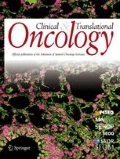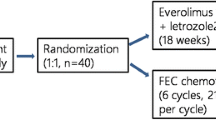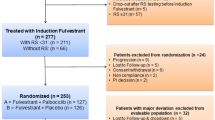Abstract
Purpose
Letrozole is superior to tamoxifen in terms of response and breast preservation rates as primary systemic therapy (PST) in postmenopausal women with ER-positive early breast cancer. However, the optimum duration of endocrine PST remains uncertain.
Methods
A phase 2 multicentre, open-label trial was conducted to evaluate the efficacy of letrozole over a preoperative period of 4 months to 1 year. Seventy postmenopausal patients (over 65 years) were recruited in four centers. The primary endpoint was to establish the optimal duration of treatment defined as the time required to attain the maximum response by clinical palpation.
Results
The median age of the group was 79 years (66–91) and the median tumour size 35 mm (range 25–100 mm). No severe adverse events were reported. Fifty-six patients were evaluable for the primary objective. A total of 43 patients (76.8%) achieved an objective response; 29 (51.8%) being partial and 14 (25.0%) complete. The median time to objective response was 3.9 months (95% CI, 3.3–4.5) and the median time to maximum response was 4.2 months (95% CI, 4.0–4.5), although 20 (37.1%) patients achieved the maximal response within 6–12 months.
Conclusions
Letrozole shows a high activity and excellent tolerability as neoadjuvant therapy in elderly patients with endocrine-dependent breast cancer. Four to six months of letrozole as PST is an optimum duration with modest benefits thereafter.
Similar content being viewed by others
References
Mouridsen H, Gershanovich M, Sun Y et al (2001) Superior efficacy of letrozole versus tamoxifen as first-line therapy for postmenopausal women with advanced breast cancer: results of a phase III study of the International Letrozole Breast Cancer Group. J Clin Oncol 19:2596–2606; erratum in: J Clin Oncol 19:3302
Mouridsen H, Gershanovich M, Sun Y et al (2003) Phase III study of letrozole versus tamoxifen as first-line therapy of advanced breast cancer in postmenopausal women: analysis of survival and update of efficacy from the International Letrozole Breast Cancer Group. J Clin Oncol 21:2101–2109
Ellis M, Ma C (2007). Letrozole in the neoadjuvant setting: the P024 trial. Breast Cancer Res Treat 105:33–43
Dixon JM, Love CD, Bellamy CO et al (2001) Letrozole as primary medical therapy for locally advanced and large operable breast cancer. Breast Cancer Res Treat 66:191–199
Eiermann W, Paepke S, Appfelstaedt J et al (2001) Preoperative treatment of postmenopausal breast cancer patients with letrozole: a randomized double-blind multicenter study. Ann Oncol 12:1527–1532
Mahillo Ramos E, Llombart Cussac A, Ruiz Simón A et al (2005) Estudio epidemiológico del grupo GEICAM sobre el cáncer de mama en España (1994–1997): Proyecto “El Álamo II” [Epidemiological study of the GEICAM group on breast cancer in Spain (1994–1997): “El Álamo II” Project]. Investigación Clínica y Farmacéutica 2:1697–2554
Ellis MJ, Buzdar G, Unzeitig GW et al (2010) ACOSOG Z1031: a randomized phase II trial comparing exemestane, letrozole, and anastrozole in postmenopausal women with clinical stage II/III estrogen receptor-positive breast cancer. J Clin Oncol 28[18s]:abstr LBA513)
Ellis MJ, Miller WR, Tao Y et al (2009) Aromatase expression and outcomes in P024 neoadjuvant endocrine therapy trial. Breast Cancer Res Treat 116:371–378
Mustacchi G, Ceccherini R, Milani S et al; Italian Cooperative Group GRETA (2003) Tamoxifen alone versus adjuvant tamoxifen for operable breast cancer of the elderly: long-term results of the phase III randomized controlled multicenter GRETA trial. Ann Oncol 14:414–420
Fennesy M, Bates T, Mc Rae et al (2004) Late follow-up of a randomized trial of surgery plus tamoxifen versus tamoxifen alone in women aged over 70 years with operable breast cancer. Br J Surg 91:699–704
Chia YH, Ellis MJ, Ma C (2010) Neoadjuvant endocrine therapy in primary breast cancer: indications and use as a research tool. Br J Cancer 103: 759–764
Smith IE, Dowsett M, Ebbs SR et al (2005) Neoadjuvant treatment of postmenopausal breast cancer with anastrozole, tamoxifen, or both in combination: the Immediate Preoperative Anastrozole, Tamoxifen, or Combined With Tamoxifen (IMPACT) Multicenter double-blind randomized trial. J Clin Oncol 23:5108–5116
Cataliotti L, Buzdar AU, Noguchi S et al (2006) Comparison of anastrozole versus tamoxifen as preoperative therapy in postmenopausal women with hormone receptor-positive breast cancer: the Pre-Operative “Arimidex” Compared to Tamoxifen (PROACT) trial. Cancer 15:2095–2103
Semiglazov V, Kletsel A, Semiglazov V et al (2005) Exemestane (E) vs tamoxifen (T) as neoadjuvant endocrine therapy for postmenopausal women with ER+ breast cancer (T2N1-2, T3N0-1, T4N0M0). J Clin Oncol 23[(16S):11S]:Abstract 530
Gil y Gil MJ, Moreno A, Perez X et al (2002) Prognostic factors of tumor response and progression free survival in patients with localized breast cancer treated with toremifene as primary therapy. Proc Am Soc Clin Oncol 21[Suppl]:2979
Barnadas A, Gil M, Gonzalez S et al (2009) Exemestane as primary treatment of estrogen receptor positive breast cancer in post menopausal women: a phase II trial. Br J Cancer 100:442–449
Goldhirsch A, Ingle JN, Gelber RD et al (2009) Thresholds for therapies: highlights of the St Gallen International Expert Consensus on the primary therapy of early breast cancer. Ann Oncol 8:1319–1329
Bates T, Riley DL, Houghton J et al (1991) Breast cancer in elderly women: a Cancer Research Campaign trial comparing treatment with tamoxifen and optimal surgery with tamoxifen alone. The Elderly Breast Cancer Working Party. Br J Surg 78:591–594
Robertson JF, Ellis IO, Elston CW et al (1992) Mastectomy or tamoxifen as initial therapy for operable breast cancer in elderly patients: 5-year follow-up. Eur J Cancer 28A:908–910
Gazet JC, Ford HT, Coombes RC et al (1994) Prospective randomized trial of tamoxifen vs surgery in elderly patients with breast cancer. Eur J Surg Oncol 20:207–214
Alba E, Calvo L, Albanell J et al; on behalf of GEICAM (2010) Chemotherapy (CT) versus hormone therapy (HT) as neoadjuvant treatment in luminal breast cancer: a multicenter, randomized phase II study (GEICAM/2006-03). J Clin Oncol 28[Suppl 7]:abstract 500
Semiglazov VF, Semiglazov VV, Dashyan GA et al (2007) Phase 2 randomized trial of primary endocrine therapy versus chemotherapy in postmenopausal patients with estrogen receptor-positive breast cancer. Cancer 110:244–254
Hind D, Wyld L, Beverley CB et al (2006) Surgery versus primary endocrine therapy for operable primary breast cancer in elderly women (70 years plus). Cochrane Database Syst Rev 1:CD004272
Fisher B, Bryant J, Wolmark N et al (1998) Effect of preoperative chemotherapy on the outcome of women with operable breast cancer. J Clin Oncol 16:2672–2685
Bear HD, Anderson S, Smith RE et al (2006) Sequential preoperative or postoperative docetaxel added to preoperative doxorubicin plus cyclophosphamide for operable breast cancer: National Surgical Adjuvant Breast and Bowel Project Protocol B-27. J Clin Oncol 24:2019–2027
Mauriac L, Durand M, Avril A et al (1991) Effects of primary chemotherapy in conservative treatment of breast cancer patients with operable tumors larger than 3 cm. Results of a randomized trial in a single centre. Ann Oncol 2: 347–354
Chen AM, Meric-Bernstam F, Hunt KK et al (2004) Breast conservation after neoadjuvant chemotherapy: the MD Anderson Cancer Center experience. J Clin Oncol 22:2303–2312
Boughey JC, Peintinger F, Meric-Bernstam F et al (2006) Impact of preoperative versus postoperative chemotherapy on the extent and number of surgical procedures in patients treated in randomized clinical trials for breast cancer. Ann Surg 244:464–470
Krainick-Strobel UE, Lichtenegger W, Wallwiener W et al (2008) Neoadjuvant letrozole in postmenopausal estrogen and/or progesterone receptor positive breast cancer: a phase IIb/III trial to investigate optimal duration of preoperative endocrine therapy. BMC Cancer 8:62
Author information
Authors and Affiliations
Corresponding author
Rights and permissions
About this article
Cite this article
Llombart-Cussac, A., Guerrero, Á., Galán, A. et al. Phase II trial with letrozole to maximum response as primary systemic therapy in postmenopausal patients with ER/PgR[+] operable breast cancer. Clin Transl Oncol 14, 125–131 (2012). https://doi.org/10.1007/s12094-012-0771-9
Received:
Accepted:
Published:
Issue Date:
DOI: https://doi.org/10.1007/s12094-012-0771-9




